Community Spread Accounts For More Than 91% of All COVID Positives
Community spread, according to the latest county data, accounts for more than 91% of all positive COVID-19 cases – for a comparison, at one point in May, that number hovered around 84%.
What do you need to know today? Here’s your bullet points:
- Community spread accounts for more than 91% of all COVID positives;
- Dallas ISD and KERA partner to offer summer math enrichment;
- Fletcher’s has a solution to your no-fair-having corny dog craving.
Community Spread Accounts For More Than 91% of All COVID Positives

Dallas County health officials reported an additional 1,077 positive cases of COVID-19 Tuesday, and nine more deaths, bringing the total case count to 28,131, including 410 deaths.
Among the dead are a Dallas man in his 60s and a Dallas woman in her 80s, neither with underlying high-risk health conditions, as well as a Mesquite man in his 90s and a Mesquite man in his 60s who did not have underlying health conditions, but died at a local emergency room.
Additionally, five residents of long-term care facilities died, including a woman in her 70s who lived at a DeSoto facility, a man in his 70s who lived in a Dallas facility, a man in his 80s who lived at a DeSoto facility and died at a hospital ER, and a man in his 90s who lived in a Mesquite facility.
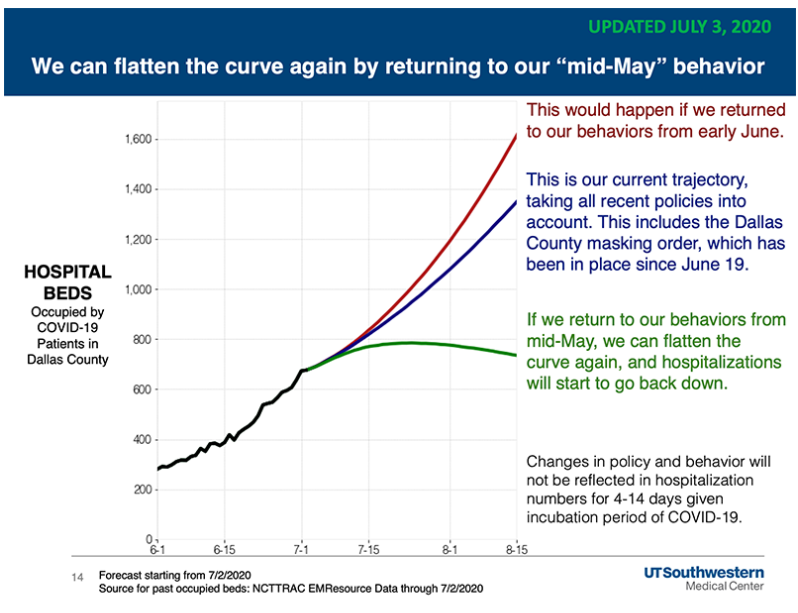
“Today’s numbers include nine deaths, most of whom did not have underlying high-risk health conditions,” Dallas County Judge Clay Jenkins said. “We continue to see wide community spread and the need for more targeted actions to keep our community safe. Doctors strongly discourage in-restaurant dining and going to the following businesses: bowling alleys, arcades, amusement parks, concert venues, sporting arenas, movie theatres, gyms (to include yoga and spin studios, etc.), and public pools.”
“Please wear your mask whenever around people outside your family and please take a face covering with you, even when going out to exercise as you may find yourself bumping into other people or unexpectedly around others.”
The county said that the average number of COVID-19 hospitalizations Monday was 756 patients.
“This daily total is close to 100 more than our previous daily number of inpatient cases,” the county noted.
Emergency room visits for COVID-19-like symptoms also continued to increase, representing about 30% of all ER visits, according to information reported to the North Central Texas Trauma Regional Advisory Council.
Of cases requiring hospitalization, more than two-thirds have been under 65 years of age, and about half do not have high-risk chronic health conditions. Diabetes has been an underlying high-risk health condition reported in about a third of all hospitalized patients with COVID-19.
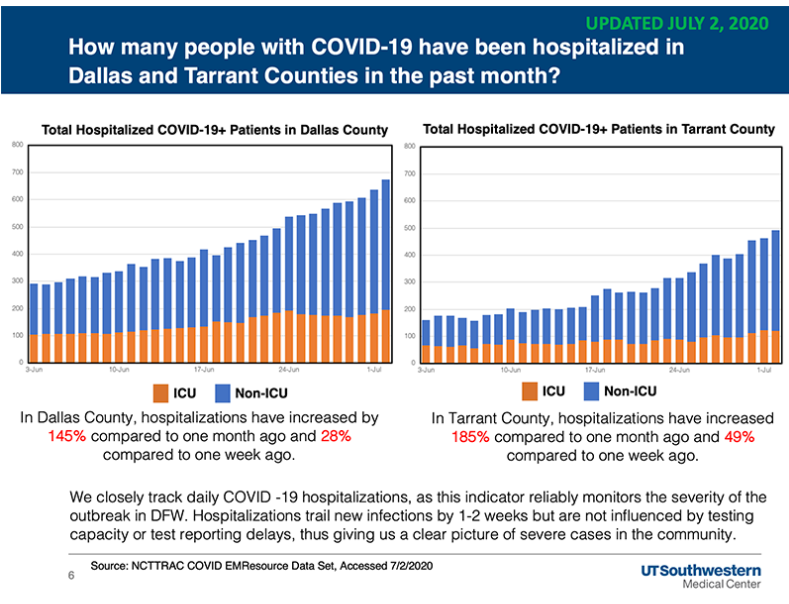
UT Southwestern’s latest forecast projects an increase of 50% in hospitalizations in Dallas and Tarrant County by July 16. By July 16, Dallas County hospitals could see concurrent hospitalizations from COVID-19 increase to between 680 and 1,100 cases, the forecast said. Regionally, hospitalizations have increased by 34% in a week, and 174% compared to a month ago. In Dallas County, hospitalizations have increased by 28% in a week, and 145% compared to a month ago.
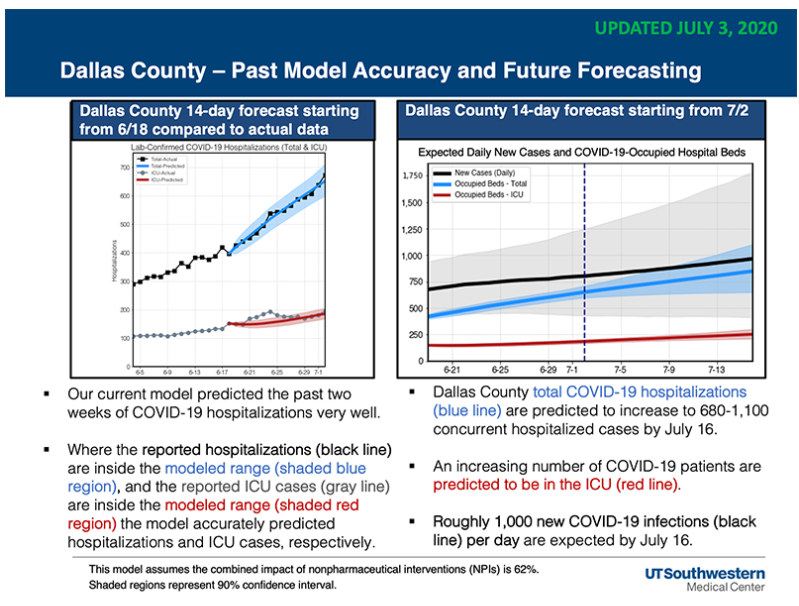
Hospitalizations are considered a more reliable indicator of the severity of the virus in the area, UTSW said, because they’re not hampered by testing delays or capacity fluctuations. However, hospitalizations (and deaths) are a lagging indicator, meaning they trail by about two weeks or so. In other words, the 1,000-plus case counts being reported last week and this week won’t begin to show in increased hospitalizations for another week or two.
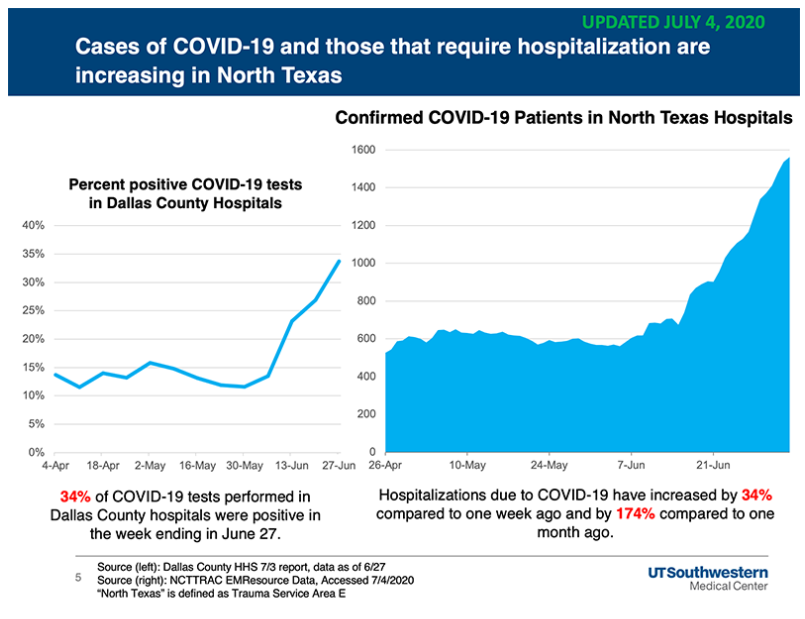
In the county’s July 7 aggregate report, most cases continue to be between the ages of 18 and 60, with the 18-40 age group accounting for 47% of the cases, and the 41-64 age group accounting for another 34% of the total cases.
“An increasing proportion of COVID-19 cases in Dallas County are being diagnosed in young adults between 18 to 39 years of age, such that of all cases reported after June 1, half have been in this age group,” the county said. “Increasing reports of cases are continuing to be associated with multiple large recreational and social gatherings since the beginning of June, including house parties.”
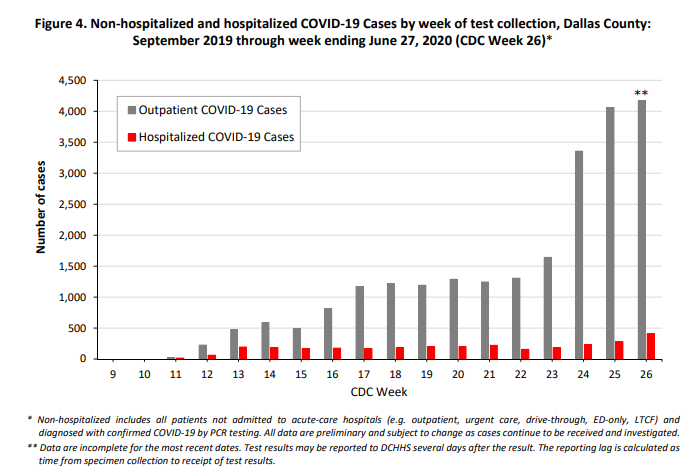
Close contact or community transmission continues to be the biggest risk factor for contracting COVID-19, accounting for 91.1% of all cases. Living in a long-term care facility or being incarcerated in the county jail are a distant second, and third, at 2.8% and 2%, respectively.
Of cases requiring hospitalization who reported employment, about 80% have been critical infrastructure workers including those in healthcare (13%), transportation (11%), food and agriculture – which includes grocery stores and places you can buy food (16%), public works (12%), and first responders (3%).
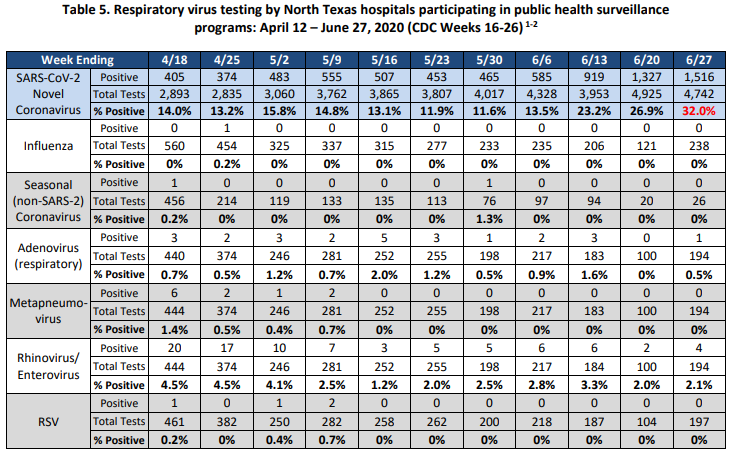
Of the testing done, positive cases accounted for 32% as of June 27, with 1,516 positives coming from 4,742 tests. Testing and positive test results of COVID-19 far outpaces any other respiratory virus – even if you combine them all.
Twelve percent of all cases ended up hospitalized – 26% ended up in intensive care, and 15% ended up on a ventilator.
In a city-by-city breakdown, Dallas still comes in with the highest number of cases – 15,621, or 55.5%. Highland Park has 27 cases so far (up from 25 Monday), and University Park has 47 (up from 43).
Dallas ISD, KERA Partner to Offer Summer Math Enrichment

To help mitigate student learning loss, Dallas ISD and KERA are partnering to create and produce “Summer Bridge to Math Success” to bring at-home learning instruction to families across North Texas.
KERA TV will feature recorded lessons from nearly 150 Dallas ISD math teachers weekdays from noon to 2:30 p.m., through Friday, Aug. 7.
Each half-hour features a handful of teachers giving brief lessons on various concepts, with two-minute breaks in between lessons. Lessons are available for grades kindergarten through eighth grade. Each half-hour features roughly 15 minutes of content for two grade levels.
“We are thankful for and excited about this KERA partnership to help reach thousands of our students and provide them with the knowledge they need to successfully start the new school year in August,” said Oswaldo Alvarenga, Dallas ISD assistant superintendent of CTE and STEM.
Studies show that school building closures caused by COVID-19, combined with the normal learning loss that happens over the summer, could have serious detrimental effects on students’ math knowledge. “Summer Bridge to Math Success” was created to help students stay on track and sharpen their math skills in the absence of in-class instruction.
“Education has always been a core part of KERA’s mission and our service to North Texas,” said Nico Leone, KERA’s president and CEO. “We’re proud to help students stay engaged this summer with this important addition to our learning resources that are always free and accessible to everyone.”
KERA also has developed an At-Home Learning Toolkit with free resources for families and teachers, including lesson plans, activities, videos, and more.
The schedule is as follows:
- 12-12:30 p.m. Kindergarten and first grade
- 12:30-1 p.m. Second and third grades
- 1-1:30 p.m. Fourth and fifth grades
- 1:30-2 p.m. Sixth and seventh grades
- 2-2:30 p.m. Eighth grade and Algebra I
Fletcher’s Has a Solution to Your No-Fair-Having Corny Dog Craving

After yesterday’s news that the State Fair of Texas would be canceled for the first time since World War II, many readers lamented the lack of their favorite things about the fair– chief among them a Fletcher’s corny dog.
Well, rest assured, the family got in touch.
According to a representative for Fletcher’s Original Corny Dogs, “For 78 years, the Fletcher’s family has served their original corny dogs to attendees of the State Fair of Texas. While they are heartbroken that the State Fair of Texas will not take place this year, they take the health of their employees and customers seriously and understand the decision that was made to protect the public at large from COVID-19.”
Over the past few months, Fletcher’s has been catering private events and public pop-ups throughout the area to feed first responders and lift the spirits of everyone affected by the pandemic. A calendar of upcoming events can be found on the company’s website.










